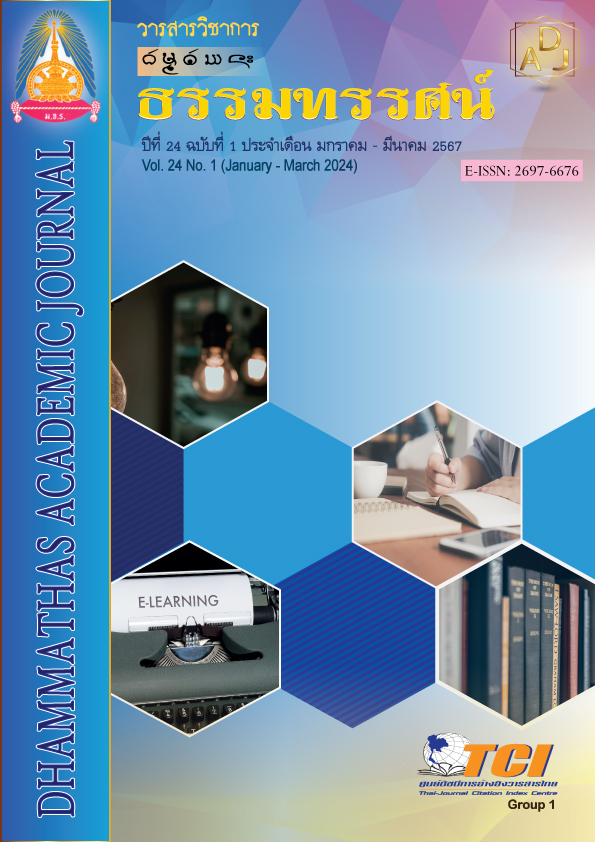An Analytical Study of Gods in Hindu Philosophy That Influence Thai Society
Main Article Content
Abstract
The purposes of this research were 1) to study the concepts of gods in Hindu philosophy, 2) to study the influences of gods in Hindu philosophy on Thai society, and 3) to analyze the influences of gods in Hindu philosophy on Thai society. It is documentary research. Collect information from primary are Vedas and secondary documents. Descriptive data were analyzed according to the inductive principle.
The results showed that:
1. Hindu philosophy states that gods exist in an abstract mental state. is something that is beyond nature It is something that exists eternally, is omniscient, has limitless power, able to influence all things according to his power. He was everywhere. He is the creator, destroyer, and ruler or preserver of all things.
2. There are 3 major deities in Hindu philosophy that influence Thai society: 1) Brahma, the creator, 2) Shiva, the destroyer, and 3) Vishnu, the preserver. These three gods are called Trimulti. The other gods are gods who are attendants such as Ganesha, Uma goddess, etc. The gods knew about the miracles in the Vedic legends so that Thai people could gain respect, but the gods in the gospels were so ignorant of Thai society that the Greek gods became the stories of the Thai people.
3. Analyze the gods in Hindu philosophy that influence Thai society. In the issue of Thai people adopting the gods that appear in Hindu philosophy as concepts for expression and conduct in daily life. By using beliefs as requirements or rules of society. And it is a symbol that leads to the behavior of people in society in 5 areas as follows: 1) Politics and government 2) Education 3) Arts 4) Culture and traditions 5) Living.
Article Details

This work is licensed under a Creative Commons Attribution-NonCommercial-NoDerivatives 4.0 International License.
เพื่อให้เป็นไปตามกฎหมายลิขสิทธิ์ ผู้นิพนธ์ทุกท่านต้องลงลายมือชื่อในแบบฟอร์มใบมอบลิขสิทธิ์บทความ ให้แก่วารสารฯ พร้อมกับบทความต้นฉบับที่ได้แก้ไขครั้งสุดท้าย นอกจากนี้ ผู้นิพนธ์ทุกท่านต้องยืนยันว่าบทความ ต้นฉบับที่ส่งมาตีพิมพ์นั้น ได้ส่งมาตีพิมพ์เฉพาะในวารสาร วิชาการธรรม ทรรศน์ เพียงแห่งเดียวเท่านั้น หากมีการใช้ ภาพหรือตารางของผู้นิพนธ์อื่นที่ปรากฏในสิ่งตีพิมพ์อื่นมาแล้ว ผู้นิพนธ์ต้องขออนุญาตเจ้าของลิขสิทธิ์ก่อน พร้อมทั้ง แสดงหนังสือที่ได้รับการยินยอมต่อบรรณาธิการ ก่อนที่บทความจะได้รับการตีพิมพ์References
ชนาภัทร์ วงศ์โรจนภรณ์. (2554). การศึกษาวิเคราะห์อิทธิพลของคำสอนเรื่องพรหมในคัมภีร์พระพุทธศาสนาที่มีต่อสังคมไทย. (วิทยานิพนธ์พุทธศาสตรมหาบัณฑิต). พระนครศรีอยุธยา: มหาวิทยาลัยมหาจุฬาลงกรณราชวิทยาลัย.
ธนากิต. (2546). ตำนานเทพเจ้าและอสูร. กรุงเทพฯ: พิมพ์ลักษณ์.
นราวัลย์ พูลพิพัฒน. (2562). เทพเจ้าในวรรณคดีไทย: บทบาทในฐานะผู้สร้างและผู้ทำลาย. พิฆเนศวร์สาร, 15(2), 69-82.
พระชาติชาย ชาตวุฑฺโฒ (สุขเอก). (2550). การศึกษาแนวคิดเกี่ยวกับสังสารวัฏในปรัชญาฮินดู. (วิทยานิพนธ์พุทธศาสตรมหาบัณฑิต). พระนครศรีอยุธยา: มหาวิทยาลัยมหาจุฬาลงกรณราชวิทยาลัย.
สุนทร ณ รังสี. (2537). ปรัชญาอินเดีย: ประวัติและลัทธิ. กรุงเทพฯ: จุฬาลงกรณ์มหาวิทยาลัย.
อรุณศักดิ์ กิ่งมณี. (2551). ตรีมูรติ: อภิมหาเทพของฮินดู. กรุงเทพฯ: เมืองโบราณ.

